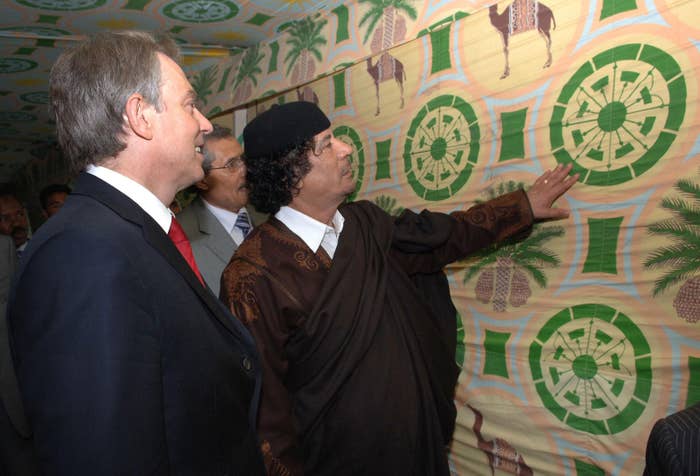
Tony Blair has defended urging Libyan leader Muammar al-Qaddafi to flee during the Arab Spring, and insisted his dealings with the dictator have helped stop chemical weapons falling into the hands of ISIS.
The former prime minister told the Commons foreign affairs select committee on Friday he had “two or three” phone calls in his capacity as a "concerned private citizen" with Qadaffi during the period in early 2011 when the Libyan leader began to lose his grip on power.
Blair said he made the calls with the knowledge of David Cameron and the then US secretary of state Hilary Clinton. During them, he urged Gadaffi to go into hiding so there could be an orderly transition of power to a new regime.
"If you have a safe place to go then you should go there, because this will not end peacefully unless that happens," Blair recalled warning the dictator.
"My idea was that he stepped aside, that there was then some form of international UN-led commission that would see what the situation was in the country. In the end events simply took over."
Instead of Blair's plan, the UK joined other countries in launching UN-backed airstrikes on Libya and the Gadaffi regime was toppled. The country is now split between two rival governments, with other areas of the oil-rich country under ISIS control.
Blair, who insisted he had no business interests in Libya, said he got to know Gadaffi during 2004 when he helped strike a deal with the dictator to abandon its extensive chemical and nuclear weapons programmes and recommence diplomatic relations . He said without this intervention ISIS could now be in control of the country's chemical weapons.
He said: "I think it is important that we brought them in from the cold, as it were, and important also in today’s context because I think - particularly if we had still had the residue of that chemical weapons programme in Libya today, given the state of Libya today and given the presence of ISIS there - it would have constituted a real risk, even today."
The former Labour leader also insisted that intelligence cooperation with Libya had proved "invaluable" to the UK in the fight against terrorism.
The British government is currently being sued by Qaddafi opponents who were detained and rendered back to Libya in a joint MI6-CIA operation in 2004 when Blair was prime minister. Once there, they were imprisoned and tortured by the regime.
Blair also made the case against toppling regimes without a longterm plan for the aftermath: “Evolution is better than revolution if you can get it. Islamism, especially when it trends into an extreme form of Islamist fundamentalism, is going to be your problem, Let’s be clear, if you took that component out of it, we wouldn’t be having this discussion today.
"The problem is once that dictatorship is removed, there are forces that will come in deliberately to destabilise the country," he told MPs. "This is what makes it completely different from a situation where you’re able to reconstruct and correct any problems of planning as you go along because you’ve got."
But he declined to criticise David Cameron or the then French president Nicolas Sarkozy for launching military action against the Qaddafi regime. "I know how difficult these decisions are. I am sure they did it for reasons that are perfectly well intentioned and in good faith," he said.
There was no way the regime could have survived, Blair said. "I think the Libyan people were not going to accept continuation of the rule of Gadaffi. At the moment Libya is a state of instability and chaos, it’s caused huge problems for the whole of the region, you’ve got groups like Boko Haram that have been strengthened as a result of the shipping of weapons and personnel from Libya. All of that is true but I don’t believe the Gadaffi regime was sustainable at the end."
Blair also suggested the region's old dictators provided greater stability and were easier to deal with than their replacements. "You often find people saying ‘wouldn’t it just be better if we dealt with the dictators?" he said. "At least when we had Assad there, and Saddam there, and Gadaffi there, and Ben Ali there, we knew what we were dealing with.' I completely understand that as an argument. But I think what the Arab Spring shows you is that however much we may wanted to have dealt with these people, the population of these countries are not going to tolerate it."
He said North Africa and the Middle East featured a "toxic mix of bad politics and abusive religion", but “one thing these very repressive regimes do is they can keep a lid on the security problem". According to Blair, Assad's rule in Syria showed the failure of a policy where countries told a leader to go but then didn't intervene to "go and get him out of there".
"Supposing we end up with an agreement in Syria as to what should happen in the future, who’s going to impose the order that allows that new constitution to take place and be implemented?”
Blair concluded by saying Gadaffi was "unusual, that's for sure" and added the Libyan dictator had a habit of giving him "eccentric" presentations on how to solve the Israel-Palestine dispute.
